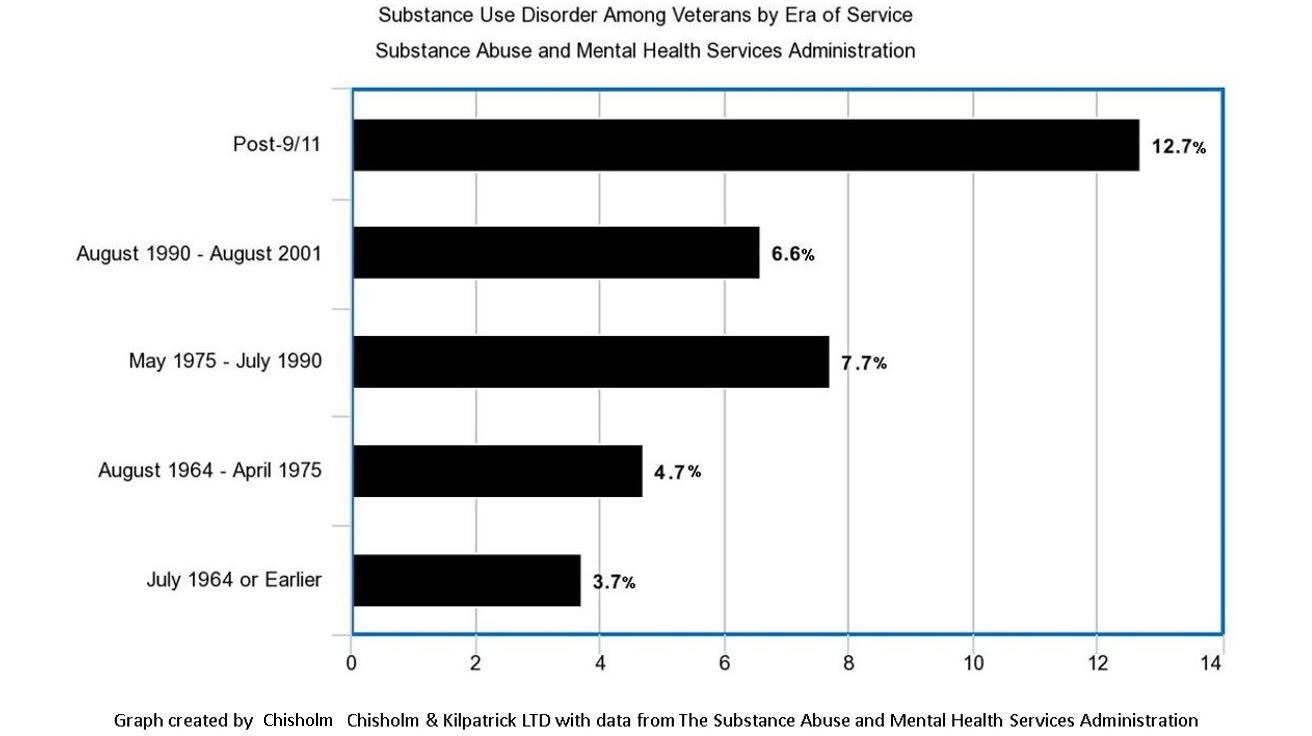Substance Use Disorder Among Veterans

CCK Law: Our Vital Role in Veterans Law
What is Substance Use Disorder (SUD)?
In order to understand how the Department of Veterans Affairs adjudicates claims for substance use disorder, it is important to first understand how they define drug and alcohol abuse. According to VA, alcohol abuse is “the use of alcoholic beverages over time, or such excessive use at any one time, sufficient to cause disability or death of the user.” Consuming an alcoholic beverage does not constitute alcohol abuse but rather, it is constituted by the length of time the behavior continues or drinking in excess. According to VA’s definition, drug abuse is:
The use of illegal drugs (including prescription drugs that are illegally or illicitly obtained), the intentional use of prescription or non-prescription drugs for a purpose other than the medically intended use, or the use of substances other than alcohol to enjoy their intoxicating effects.
Prevalence of Substance Use Disorder Among Veterans
The Substance Abuse and Mental Health Services Administration (SAMHSA) estimates that 7.1% of all U.S. veterans met the criteria for substance use disorder between 2004 and 2006. The rate of veterans with substance use disorder is disproportionate among time periods served, as shown in the graph below.

Why do Veterans Experience Substance Use Disorder?
Veterans often encounter phycological stress or physical ailments as a result of their time spent in service due to the demanding environment of military life and events in combat. Substance use disorder can arise due to many factors. Prolonged treatment of physical pain with prescription narcotics can result in dependence on said substance. Additionally, many veterans may try to cope with the symptoms of psychological trauma, post-traumatic stress disorder (PTSD), and traumatic brain injuries (TBIs) using substances such as alcohol or narcotics. According to VA, “getting PTSD increases the risk that he or she will develop a drinking or drug problem.”
The Substance Abuse and Mental Health Services Administration states that about 18.5% of veterans returning from Iraq and Afghanistan have or have had PTSD or depression. 19.5% of this same population of veterans have experienced a traumatic brain injury (TBI) while deployed. SAMHSA estimates that only about 50% of returning servicemembers in need of mental health treatment actually seek it; lack of appropriate treatment may lead to self-medicating with substances. Military Sexual Trauma (MST) is another event servicemembers can experience, resulting in psychological trauma or PTSD. According to VA statistics, 55% of women veterans and 38% of male veterans have experienced sexual harassment in service.
VA studies have revealed a strong connection between substance use disorder and PTSD:
- Over 20% of veterans with PTSD also have SUD.
- Nearly 1 out of every 3 veterans seeking SUD treatment also have PTSD.
Can Veterans be Service-Connected for Substance Use Disorder?
Veterans cannot be directly service-connected for substance use disorder; however, they can be service connected on a secondary basis for disabilities that arise from drug use due to a service-connected condition. Veterans can receive ratings for substance-related disabilities as long as the substance use was not the veteran’s own “willful misconduct.” VA defines willful misconduct as “an act involving conscious wrongdoing or known prohibited action.”
To better understand this concept of service connection, let’s take a look at a few examples:
- A Vietnam combat Veteran has PTSD and uses alcohol to cope with his psychological symptoms and sleep disturbances. As a result of this prolonged alcohol use, he gets cirrhosis of the liver. This veteran may be able to receive disability compensation for his cirrhosis of the liver as secondary to his PTSD.
- A veteran has a service-connected orthopedic injury that causes her great pain on a daily basis. She is prescribed opiates for her pain. She then develops renal disease as a result of this prolonged medication regiment. This veteran may be able to receive disability compensation for her renal disease as secondary to her initial injury.
VA Treatment Options
VA offers many services to treat veterans struggling with substance use. These services can include options such as medication, therapy, and treatment of co-occurring conditions such as PTSD.
As stated on VA’s website, medication options for these veterans include:
- Medically managed detoxification to stop substance use safely, and services to stabilize;
- Drug substitution therapies and medicines to lessen cravings;
- Nicotine replacement therapy or medications
Counseling and therapy options include:
- Short-term outpatient counseling
- Intensive outpatient treatment
- Marriage and family counseling
- Self-help groups
- Residential care
- Continuing care and relapse prevention
- Programs for veterans with specific needs (e.g. homeless veterans)
For a full list of services offered by VA in regards to substance use, click here.
About the Author
Share this Post
